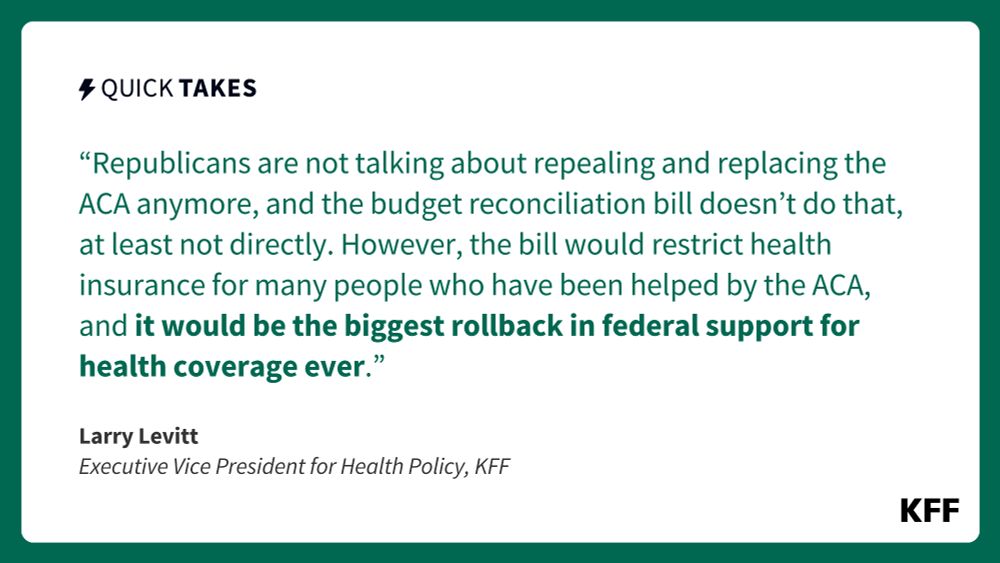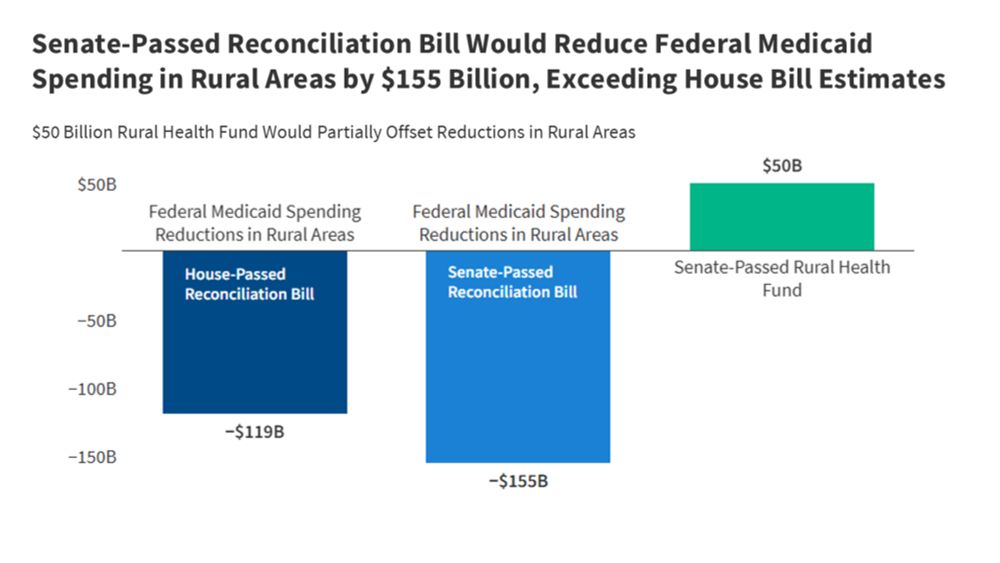Amaya Diana
@amayadiana.bsky.social
600 followers
520 following
51 posts
Medicaid Health Policy @ KFF, will post mostly about 1115 waivers. go birds.
Posts
Media
Videos
Starter Packs
Amaya Diana
@amayadiana.bsky.social
· Jun 23

A Closer Look at the Medicaid Work Requirement Provisions in the “Big Beautiful Bill” | KFF
On May 22, the House passed a budget reconciliation bill that includes significant changes to the Medicaid program. On June 16, the Senate Finance committee released proposed reconciliation language w...
www.kff.org
Reposted by Amaya Diana
Amaya Diana
@amayadiana.bsky.social
· Jun 17

Tracking the Medicaid Provisions in the 2025 Reconciliation Bill | KFF
KFF is tracking the Medicaid provisions in the 2025 federal budget bill, including new Medicaid work and verification requirements and a reduction in the expansion match rate for states that use their...
www.kff.org
Reposted by Amaya Diana
Reposted by Amaya Diana
Larry Levitt
@larrylevitt.bsky.social
· Jun 10

The Biggest Rollback in Federal Support for Health Coverage Ever
Republicans are not talking about repealing and replacing the ACA anymore, and the budget reconciliation bill doesn't do that, at least not directly. However, the bill would restrict health insurance ...
www.kff.org
Reposted by Amaya Diana
Reposted by Amaya Diana
Amaya Diana
@amayadiana.bsky.social
· Apr 17
Reposted by Amaya Diana
Robin Rudowitz
@robinr.bsky.social
· Apr 1

Medicaid and CHIP Eligibility, Enrollment, and Renewal Policies | KFF
A KFF survey of state Medicaid officials examines state Medicaid and CHIP eligibility, enrollment, and renewal policies in place as of January 2025 as states return to routine operations following the...
www.kff.org
Reposted by Amaya Diana
Liz Williams
@liz-williams.bsky.social
· Mar 25

Putting $880 Billion in Potential Federal Medicaid Cuts in Context of State Budgets and Coverage | KFF
This brief explores the magnitude of the potential federal Medicaid funding cuts under the House budget resolution. This brief puts the $880 billion in cuts in context by comparing the size of the cut...
www.kff.org
Reposted by Amaya Diana
Amaya Diana
@amayadiana.bsky.social
· Feb 25

The Debate Over Federal Medicaid Cuts: Perspectives of Medicaid Enrollees Who Voted for President Trump and Vice President Harris | KFF
The Republican-led Congress is considering plans to cut Medicaid to help pay for tax cuts, with the House budget resolution targeting $880 billion or more in potential reductions to federal Medicaid s...
www.kff.org












![quote 1: If you take money from Medicaid, you’re just creating another problem elsewhere. It’s gonna be a group of people that are being hurt over here to help the people over there so it doesn’t add up. It doesn’t make sense. –45-year-old, Hispanic male (Trump voter, Arizona)
quote 2: Leave it alone and make it better. –57-year-old, White female (Trump voter, Missouri)
quote 3: I would just beg them please to do their best to keep medical coverage for people that need it. And I mean, I live every day, day to day taking my meds and I need it. I don’t know what I would do without it. –39-year-old, Black male (Trump voter, Ohio)
quote 4: Well, I think they should step back and look at it and realize that we’re not just a number on a spreadsheet or something that. We’re actually people and what they decide to do has consequences. –39-year-old, White male (Harris voter, Kentucky)
quote 5: Ask yourself, if you’re the person to make the decision to cut [Medicaid], if it was you and someone in your family [who would be affected], what would you do if it was you? – 59-year-old, White male (Harris voter, Pennsylvania)](https://cdn.bsky.app/img/feed_thumbnail/plain/did:plc:e6yd2ulnejydqlqmicmikvrn/bafkreibl5bvp7k46rgj6tmgzi73kcjv5klzmmte56ujozjsvns3d6kragy@jpeg)


![quote 1: Required? Oh yeah. Easy. Oh yeah, absolutely. Mind you, I can’t do certain jobs. I can’t drive, if you will, but yeah, I can, I could do it. I can make it work. – 45-year-old, Hispanic male (Harris voter, Arizona)
quote 2: It’s gonna be devastating and upsetting to, you know, if you lose your health insurance if I forget as we tend to, we are only humans, sometimes we forget things. So if I don’t do this [report work hours], it affects the rest of my household and I don’t like that. – 45-year-old, Black female (Harris voter, Ohio)
quote 3: I would be very worried about them making mistakes. There’s been many times I’ve sent in paperwork and they didn’t get it and coverage was stopped. You know, a lot of room for clerical error and things like that. – 50-year-old, White female (Trump voter, Nevada)](https://cdn.bsky.app/img/feed_thumbnail/plain/did:plc:e6yd2ulnejydqlqmicmikvrn/bafkreifhhla3fa7o5uqhcs4lbx7sevbshl324jkuy5w6ko4i225qw5ecnq@jpeg)